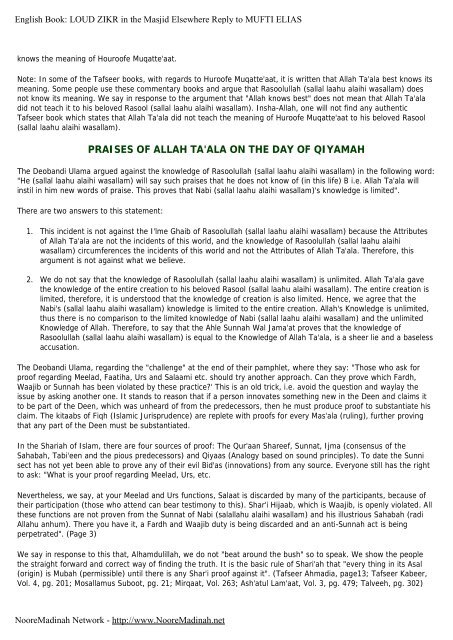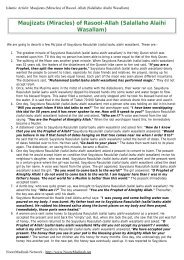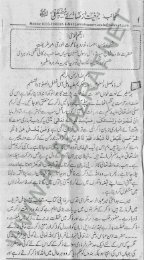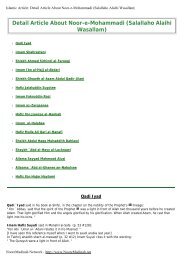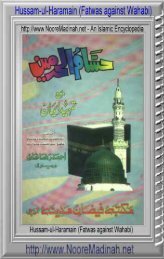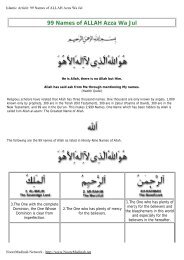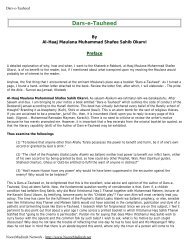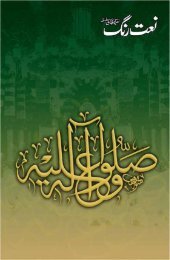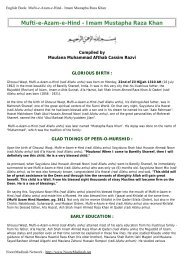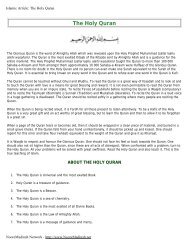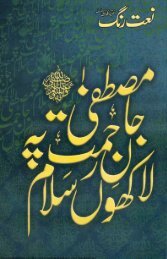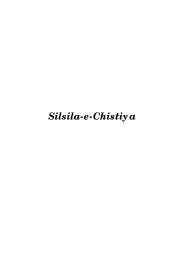LOUD ZIKR in the Masjid & Elsewhere & Reply to MUFTI ELIAS
LOUD ZIKR in the Masjid & Elsewhere & Reply to MUFTI ELIAS
LOUD ZIKR in the Masjid & Elsewhere & Reply to MUFTI ELIAS
Create successful ePaper yourself
Turn your PDF publications into a flip-book with our unique Google optimized e-Paper software.
English Book: <strong>LOUD</strong> <strong>ZIKR</strong> <strong>in</strong> <strong>the</strong> <strong>Masjid</strong> <strong>Elsewhere</strong> <strong>Reply</strong> <strong>to</strong> <strong>MUFTI</strong> <strong>ELIAS</strong><br />
knows <strong>the</strong> mean<strong>in</strong>g of Houroofe Muqatte'aat.<br />
Note: In some of <strong>the</strong> Tafseer books, with regards <strong>to</strong> Huroofe Muqatte'aat, it is written that Allah Ta'ala best knows its<br />
mean<strong>in</strong>g. Some people use <strong>the</strong>se commentary books and argue that Rasoolullah (sallal laahu alaihi wasallam) does<br />
not know its mean<strong>in</strong>g. We say <strong>in</strong> response <strong>to</strong> <strong>the</strong> argument that "Allah knows best" does not mean that Allah Ta'ala<br />
did not teach it <strong>to</strong> his beloved Rasool (sallal laahu alaihi wasallam). Insha-Allah, one will not f<strong>in</strong>d any au<strong>the</strong>ntic<br />
Tafseer book which states that Allah Ta'ala did not teach <strong>the</strong> mean<strong>in</strong>g of Huroofe Muqatte'aat <strong>to</strong> his beloved Rasool<br />
(sallal laahu alaihi wasallam).<br />
PRAISES OF ALLAH TA'ALA ON THE DAY OF QIYAMAH<br />
The Deobandi Ulama argued aga<strong>in</strong>st <strong>the</strong> knowledge of Rasoolullah (sallal laahu alaihi wasallam) <strong>in</strong> <strong>the</strong> follow<strong>in</strong>g word:<br />
"He (sallal laahu alaihi wasallam) will say such praises that he does not know of (<strong>in</strong> this life) B i.e. Allah Ta'ala will<br />
<strong>in</strong>stil <strong>in</strong> him new words of praise. This proves that Nabi (sallal laahu alaihi wasallam)'s knowledge is limited".<br />
There are two answers <strong>to</strong> this statement:<br />
1. This <strong>in</strong>cident is not aga<strong>in</strong>st <strong>the</strong> I'lme Ghaib of Rasoolullah (sallal laahu alaihi wasallam) because <strong>the</strong> Attributes<br />
of Allah Ta'ala are not <strong>the</strong> <strong>in</strong>cidents of this world, and <strong>the</strong> knowledge of Rasoolullah (sallal laahu alaihi<br />
wasallam) circumferences <strong>the</strong> <strong>in</strong>cidents of this world and not <strong>the</strong> Attributes of Allah Ta'ala. Therefore, this<br />
argument is not aga<strong>in</strong>st what we believe.<br />
2. We do not say that <strong>the</strong> knowledge of Rasoolullah (sallal laahu alaihi wasallam) is unlimited. Allah Ta'ala gave<br />
<strong>the</strong> knowledge of <strong>the</strong> entire creation <strong>to</strong> his beloved Rasool (sallal laahu alaihi wasallam). The entire creation is<br />
limited, <strong>the</strong>refore, it is unders<strong>to</strong>od that <strong>the</strong> knowledge of creation is also limited. Hence, we agree that <strong>the</strong><br />
Nabi's (sallal laahu alaihi wasallam) knowledge is limited <strong>to</strong> <strong>the</strong> entire creation. Allah's Knowledge is unlimited,<br />
thus <strong>the</strong>re is no comparison <strong>to</strong> <strong>the</strong> limited knowledge of Nabi (sallal laahu alaihi wasallam) and <strong>the</strong> unlimited<br />
Knowledge of Allah. Therefore, <strong>to</strong> say that <strong>the</strong> Ahle Sunnah Wal Jama'at proves that <strong>the</strong> knowledge of<br />
Rasoolullah (sallal laahu alaihi wasallam) is equal <strong>to</strong> <strong>the</strong> Knowledge of Allah Ta'ala, is a sheer lie and a baseless<br />
accusation.<br />
The Deobandi Ulama, regard<strong>in</strong>g <strong>the</strong> "challenge" at <strong>the</strong> end of <strong>the</strong>ir pamphlet, where <strong>the</strong>y say: "Those who ask for<br />
proof regard<strong>in</strong>g Meelad, Faatiha, Urs and Salaami etc. should try ano<strong>the</strong>r approach. Can <strong>the</strong>y prove which Fardh,<br />
Waajib or Sunnah has been violated by <strong>the</strong>se practice?' This is an old trick, i.e. avoid <strong>the</strong> question and waylay <strong>the</strong><br />
issue by ask<strong>in</strong>g ano<strong>the</strong>r one. It stands <strong>to</strong> reason that if a person <strong>in</strong>novates someth<strong>in</strong>g new <strong>in</strong> <strong>the</strong> Deen and claims it<br />
<strong>to</strong> be part of <strong>the</strong> Deen, which was unheard of from <strong>the</strong> predecessors, <strong>the</strong>n he must produce proof <strong>to</strong> substantiate his<br />
claim. The kitaabs of Fiqh (Islamic Jurisprudence) are replete with proofs for every Mas'ala (rul<strong>in</strong>g), fur<strong>the</strong>r prov<strong>in</strong>g<br />
that any part of <strong>the</strong> Deen must be substantiated.<br />
In <strong>the</strong> Shariah of Islam, <strong>the</strong>re are four sources of proof: The Qur'aan Shareef, Sunnat, Ijma (consensus of <strong>the</strong><br />
Sahabah, Tabi'een and <strong>the</strong> pious predecessors) and Qiyaas (Analogy based on sound pr<strong>in</strong>ciples). To date <strong>the</strong> Sunni<br />
sect has not yet been able <strong>to</strong> prove any of <strong>the</strong>ir evil Bid'as (<strong>in</strong>novations) from any source. Everyone still has <strong>the</strong> right<br />
<strong>to</strong> ask: "What is your proof regard<strong>in</strong>g Meelad, Urs, etc.<br />
Never<strong>the</strong>less, we say, at your Meelad and Urs functions, Salaat is discarded by many of <strong>the</strong> participants, because of<br />
<strong>the</strong>ir participation (those who attend can bear testimony <strong>to</strong> this). Shar'i Hijaab, which is Waajib, is openly violated. All<br />
<strong>the</strong>se functions are not proven from <strong>the</strong> Sunnat of Nabi (salallahu alaihi wasallam) and his illustrious Sahabah (radi<br />
Allahu anhum). There you have it, a Fardh and Waajib duty is be<strong>in</strong>g discarded and an anti-Sunnah act is be<strong>in</strong>g<br />
perpetrated". (Page 3)<br />
We say <strong>in</strong> response <strong>to</strong> this that, Alhamdulillah, we do not "beat around <strong>the</strong> bush" so <strong>to</strong> speak. We show <strong>the</strong> people<br />
<strong>the</strong> straight forward and correct way of f<strong>in</strong>d<strong>in</strong>g <strong>the</strong> truth. It is <strong>the</strong> basic rule of Shari'ah that "every th<strong>in</strong>g <strong>in</strong> its Asal<br />
(orig<strong>in</strong>) is Mubah (permissible) until <strong>the</strong>re is any Shar'i proof aga<strong>in</strong>st it". (Tafseer Ahmadia, page13; Tafseer Kabeer,<br />
Vol. 4, pg. 201; Mosallamus Suboot, pg. 21; Mirqaat, Vol. 263; Ash'atul Lam'aat, Vol. 3, pg. 479; Talveeh, pg. 302)<br />
NooreMad<strong>in</strong>ah Network - http://www.NooreMad<strong>in</strong>ah.net


